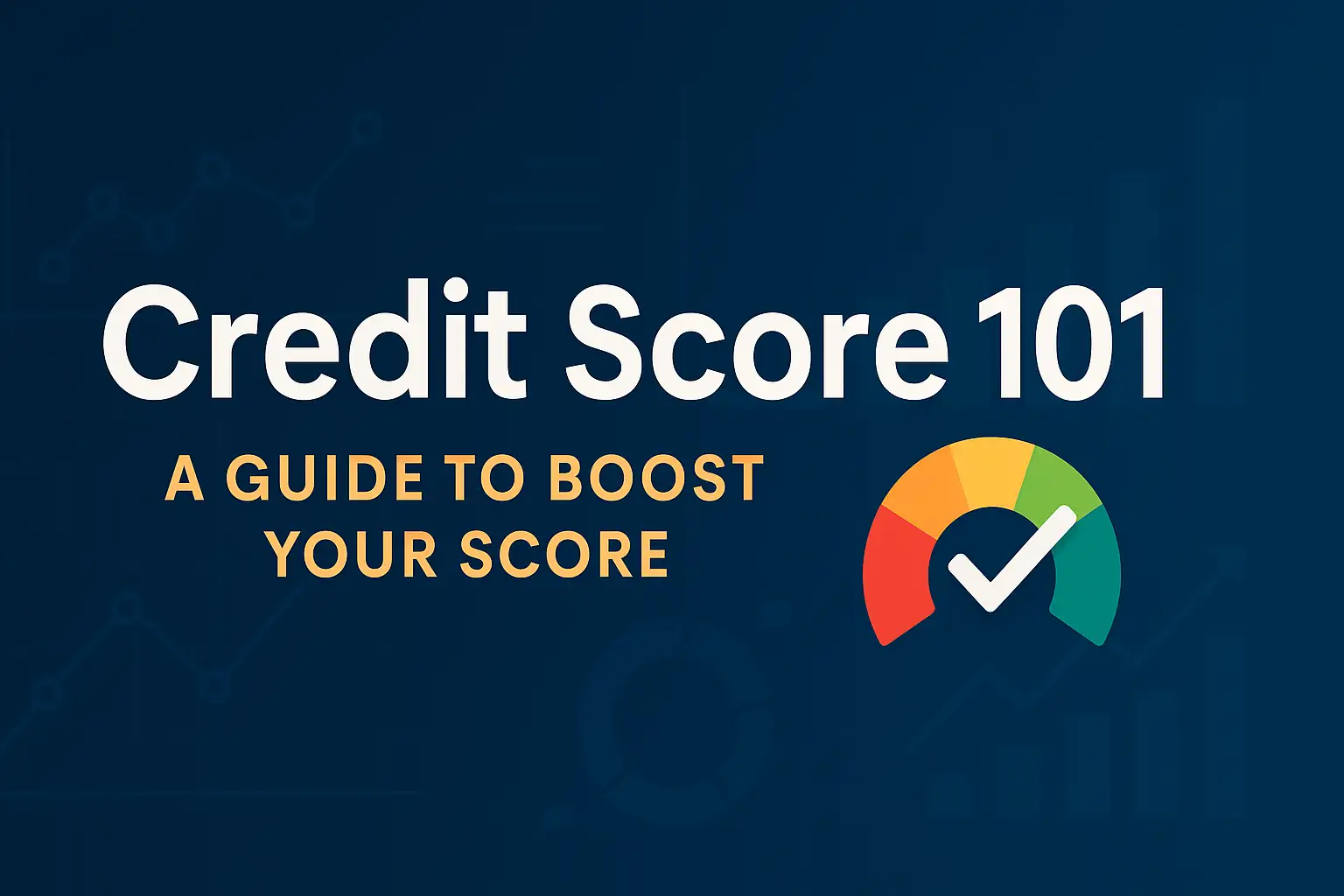Credit Score 101: Your Ultimate Guide to Understanding and Boosting Your Score in 2025
Navigating the world of credit scores can feel like trying to solve a puzzle with missing pieces. You know it’s important, but the jargon, numbers, and stakes—like getting a loan or renting an apartment—can be overwhelming. A low score might block your dreams, while a good one opens doors. It’s stressful, right?
Credit Score 101 is here to simplify it all. This guide breaks down what a credit score is, why it matters, and how to boost it fast. From checking your score for free to debunking myths, you’ll learn practical steps to take control. Whether you’re a beginner or rebuilding credit, let’s unlock your financial potential in 2025.
What Is a Credit Score 101 and Why It Matters?
A credit score is your financial report card, and it impacts almost every big money move you make. Understanding it is the first step to mastering your finances. Let’s dive into the basics.
Defining a Credit Score and Its Role in Financial Life
A credit score is a three-digit number (300-850) that shows how well you manage credit. Lenders, landlords, and even employers use it to gauge your reliability. Think of it as your money reputation.
Real-World Impacts: Loans, Rentals, and Job Applications
A high score can get you a mortgage with low interest or a dream apartment. A low score? You might face rejections or sky-high rates. Some employers even check scores for financial roles.
Common Scoring Models: FICO vs. VantageScore
FICO (used by 90% of lenders) and VantageScore are the main models. Both weigh similar factors but differ slightly in calculations. Knowing both helps you understand your standing.
Read more: Ultimate Guide to Mastering Your Credit Score
The Factors That Shape Your Credit Score 101
Your credit score isn’t random—it’s built on five key factors. Knowing these helps you focus on what matters most. Here’s how they break down.
Payment History: The Biggest Player (35%)
Paying bills on time is critical. Even one late payment can drop your score. Set up auto-pay to avoid slip-ups, like forgetting a $20 phone bill.
Credit Utilization: Keeping Your Balances Low (30%)
This is how much credit you use versus your limit. Keep it below 30%—so, on a $1,000 limit, don’t owe more than $300. Pay down balances to boost your score fast.
Length of Credit History: Why Time Matters (15%)
Older accounts raise your score. Don’t close that first credit card, even if you rarely use it. It’s like a trophy for your financial longevity.
Types of Credit: Variety Can Help (10%)
A mix of credit cards, loans, and mortgages looks good. But don’t overdo it—variety helps only if you manage it well.
New Credit Inquiries: Proceed with Caution (10%)
Applying for multiple cards in a short time raises red flags. Limit hard inquiries (when lenders check your credit) to one or two per year.
Why a Good Credit Score Opens Doors?
A strong credit score is like a golden ticket to financial opportunities. It saves you money and stress. Here’s why it’s worth building.
Easier Loan and Credit Card Approvals
Banks love scores above 700. You’re more likely to get approved for loans or premium credit cards with cashback or travel perks.
Lower Interest Rates and Better Terms
A 750 score might get a 4% mortgage rate, while a 600 score could mean 6%. On a $200,000 loan, that’s $20,000 extra in interest over 30 years.
Benefits for Renting, Insurance, and More
Landlords often require 650+ scores. Some insurers offer lower rates to high scorers. A good score even helps with utility deposits.
The Downsides of a Poor Credit Score
A low credit score can feel like a ball and chain, limiting your options. Understanding the risks motivates you to improve. Let’s look at the consequences.
Higher Interest Rates and Loan Denials
Scores below 600 often mean loan rejections or rates as high as 15% on personal loans. That’s hundreds extra monthly.
Limited Credit Card Options
You might only qualify for high-fee cards with low limits. Premium cards with rewards? Out of reach until your score climbs.
Challenges with Rentals or Utilities
Landlords may reject you or demand bigger deposits. Utility companies might require upfront payments, tying up your cash.
How to Check and Monitor Your Credit Score 101?
Knowing your score is the first step to improving it. Luckily, checking is easier than ever. Here’s how to stay on top of it.
Free Ways to Check: AnnualCreditReport.com and Apps
Get free reports from Equifax, Experian, and TransUnion at AnnualCreditReport.com. Apps like Credit Karma offer free score updates, no strings attached.
Using Credit Monitoring Services: Are They Worth It?
Paid services like Experian IdentityWorks alert you to changes. They’re handy but not essential—free apps work fine for most.
How Often to Check and What to Look For
Check your score monthly and reports yearly. Look for errors, like a late payment you didn’t make, or signs of identity theft.
Your Credit Report: How to Read and Fix Errors
Your credit report is the story behind your score. Learning to read it can save you from costly mistakes. Here’s how to tackle it.
Understanding Key Sections of Your Report
Reports list your accounts, payment history, and inquiries. Check for accuracy in personal info, balances, and payment statuses.
Spotting Errors Like Wrong Accounts or Late Payments
Errors happen—like a paid-off loan marked as active. Emma, a 28-year-old nurse, found a $500 error on her report and raised her score by 50 points after fixing it.
Steps to Dispute Inaccuracies with Bureaus
File a dispute online with Equifax, Experian, or TransUnion. Include proof, like payment receipts. Most disputes resolve in 30 days.
Read more: Mastering Personal Finance with Your Guide to Financial Freedom
5 Proven Ways to Boost Your Credit Score 101
Ready to raise your score? These five strategies work for beginners and those rebuilding credit. Start small, and you’ll see results.
Pay Bills on Time, Every Time
Late payments hurt most. Set reminders or auto-pay for all bills—credit cards, utilities, even Netflix. Consistency builds trust with lenders.
Lower Your Credit Utilization Ratio
Pay down balances to under 30% of your limit. For example, reduce a $900 balance on a $1,000 card to $300 for a quick score bump.
Build Credit with Secured Cards or Authorized User Status
Secured cards require a deposit but report like regular cards. Or, ask a trusted friend to add you as an authorized user on their card.
Avoid Opening Too Many New Accounts
Each application triggers a hard inquiry, dinging your score. Apply for one card or loan at a time, spaced out by six months.
Add Utility Payments to Your Credit File
Services like Experian Boost add on-time utility or rent payments to your report. It’s like getting credit for bills you already pay.
How to Maintain a Strong Credit Score 101?
Once your score is solid, keep it that way. These habits ensure you stay in the 700+ club. It’s like maintaining a healthy diet for your finances.
Keep Utilization Below 30%
Pay off balances monthly or keep them low. If your limit is $5,000, don’t owe more than $1,500 across all cards.
Limit Hard Inquiries
Only apply for credit you need. Shopping for a car loan? Do it within a 14-day window to minimize inquiry impacts.
Retain Old Accounts for History Length
Keep old cards open, even with a $0 balance. Closing a 10-year-old account shortens your history, hurting your score.
Recovering from Bad Credit: Is It Possible?
Bad credit isn’t the end of the road. With patience, you can rebuild. Here’s how to bounce back from setbacks.
Strategies for Rebuilding After Setbacks
Focus on small, consistent actions. Pay all bills on time and reduce debt. Every positive step moves the needle.
Secured Cards and Credit-Builder Loans
Secured cards, like a $200-deposit card, report to bureaus. Credit-builder loans let you save while building credit—perfect for beginners.
Navigating Bankruptcy or Collections
Bankruptcy stays on your report for 7-10 years, but you can rebuild sooner. Pay off collections and negotiate deletions with creditors.
Debunking 5 Common Credit Score 101 Myths
Misinformation can derail your progress. Let’s bust five myths that trip up even savvy folks. Knowing the truth keeps you on track.
Myth: Checking Your Score Hurts It
Fact: Checking your own score (soft inquiry) doesn’t affect it. Use free apps without worry.
Myth: You Need to Carry a Balance
Fact: Paying in full monthly is best. Carrying a balance doesn’t boost your score—it just costs interest.
Myth: Closing Old Cards Always Helps
Fact: Closing old accounts shortens your history. Keep them open unless they have high fees.
Myth: A Perfect Score Is Necessary
Fact: A score of 760+ gets you the best rates. Chasing 850 isn’t worth the effort.
Myth: Income Affects Your Score
Fact: Income doesn’t factor in. Your score reflects credit behavior, not your paycheck.
Credit Score 101 Terms Every Beginner Should Know
Credit lingo can be confusing. These terms are your cheat sheet to sounding like a pro. Let’s simplify the jargon.
APR, Credit Limit, and Utilization Ratio
APR is your card’s interest rate. Credit limit is how much you can borrow. Utilization ratio is your balance divided by your limit.
Hard vs. Soft Inquiries
Hard inquiries (loan applications) may lower your score slightly. Soft inquiries (like checking your score) don’t.
FICO, VantageScore, and Credit Bureaus
FICO and VantageScore are scoring models. Bureaus (Equifax, Experian, TransUnion) collect your credit data.
People Also Ask
What Is a Good Credit Score in 2025?
A score of 670-739 is good, 740-799 is very good, and 800+ is excellent. Aim for 740+ for the best rates.
How Long Does It Take to Improve a Credit Score?
With consistent effort, you can see a 20-50 point jump in 3-6 months. Major fixes, like removing errors, can take 30-60 days.
Does Checking My Credit Score Lower It?
No, checking your own score is a soft inquiry and doesn’t hurt. Do it as often as you like.
Can I Improve My Credit Score 101 Without a Credit Card?
Yes, use Experian Boost for utility payments or take out a credit-builder loan to build credit without cards.
What Happens If I Miss a Payment?
A missed payment can drop your score by 50-100 points if reported (after 30 days). Pay ASAP to minimize damage.
How Do I Dispute Errors on My Credit Report?
File a dispute online with the bureau showing the error. Include proof, like payment records. Expect a response in 30 days.
Conclusion: Take Control of Your Credit Score Today
Credit Score 101 gives you the tools to understand, boost, and maintain your score in 2025. From paying bills on time to debunking myths, these steps can transform your financial future. A strong score means better loans, lower rates, and less stress. Start by checking your score for free and taking one action—like lowering your credit utilization. Share your credit journey or questions in the comments—we’d love to hear from you!







